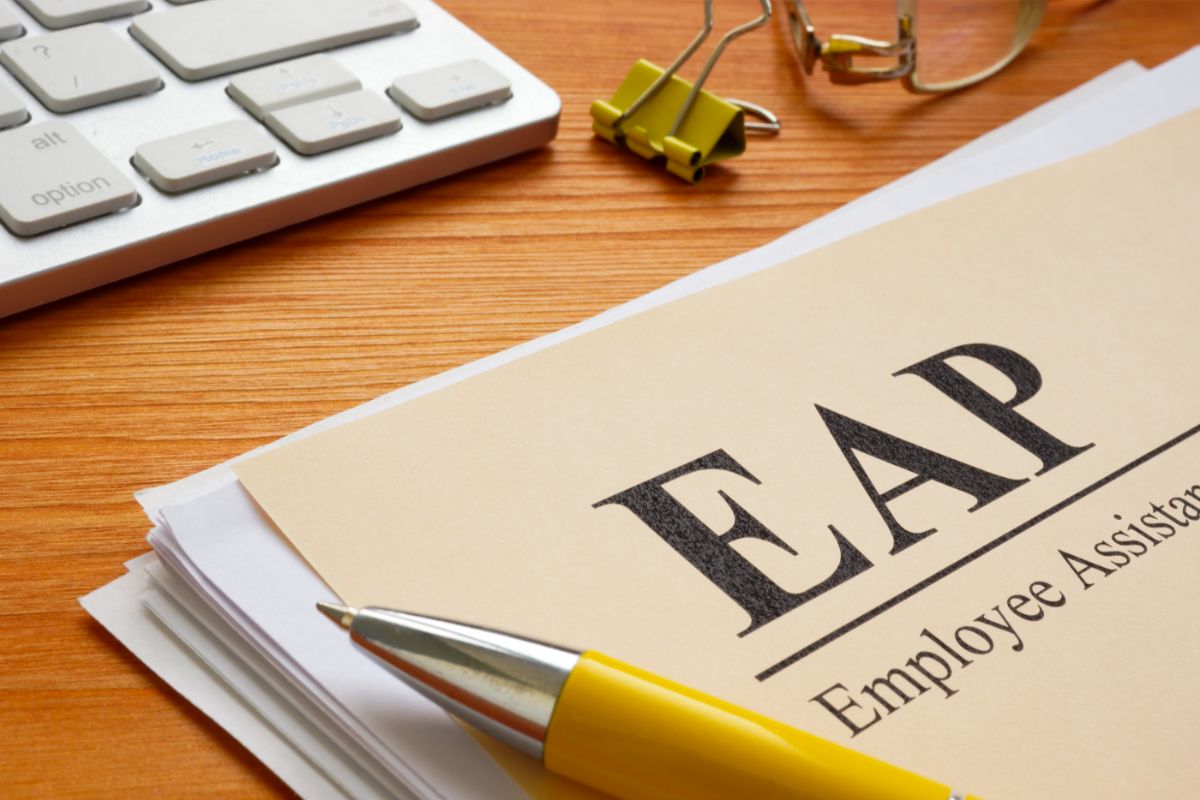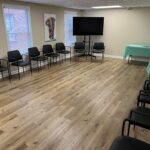EAP for Substance Abuse
If you or a loved one are struggling with addiction, consider seeking help with an employee assistance program (EAP) for substance abuse. Talk to your employer about coverage and benefits.
Contact Hand in Hand Recovery Center today to begin your recovery from drug addiction.
EAP for Substance Abuse
If you or a loved one are struggling with addiction, consider seeking help with an employee assistance program (EAP) for substance abuse. Talk to your employer about coverage and benefits.
Contact Hand in Hand Recovery Center today to begin your recovery from drug addiction.

Addiction issues among employees can be a difficult challenge for employers to navigate. While it’s crucial to offer support, it’s equally important to ensure that the rest of your team remains protected. Employees struggling with addiction can lead to significant costs for businesses, including lost productivity and increased healthcare expenses. If you’ve noticed a decline in an employee’s performance, addiction or mental health issues may be a factor. Hand in Hand Recovery offers an EAP for substance abuse that allows individuals to get the help they need, so that they can reclaim their life in a healthy and sustainable way.
At Hand in Hand Recovery Center, we know how challenging it is for men to reach out for help. Our compassionate and caring team is here to give you the best and most effective treatment experience. Reach out to our addiction treatment center in Marietta, Georgia, today to get started.
What is an Employee Assistance Program for Substance Abuse & Mental Health?
An Employee Assistance Program (EAP) for substance abuse and mental health is a workplace support initiative aimed at helping employees address personal challenges that may impact their work performance. Employers often offer EAPs as a voluntary, no-cost benefit to staff, with the goal of fostering a healthier and more productive workforce. These programs not only provide immediate assistance but also offer continuous support to employees throughout their recovery journey. This ensures they successfully re-engage with their roles and maintain long-term well-being in their work environment.
How Substance Use Disorder Can Affect The Workplace
Unfortunately substance use disorder (SUD) can affect even the most dedicated of employees. When an individual is struggling with addiction, it often impacts every aspect of their lives—including their job. Examples of ways that substance abuse can negatively affect the workplace include:
- Looking unkempt or disorganized
- Frequently nodding off during work
- Failing to meet deadlines
- Decline in work quality
- Unpredictable mood swings
- Getting along poorly with co-workers
- Chronic lateness or frequent absences
- Taking frequent or extended restroom breaks
- Regularly losing temper or having sudden outbursts of anger
How Mental Health Disorders Can Affect the Workplace
Despite their best efforts, mental health challenges can hurt an individual’s progress and productivity at work. Employers should be on the lookout, so that they can offer assistance to employees who may be having a difficult time with their mental health. Signs that a person could benefit from an EAP include:
- Having low enthusiasm
- Acting sluggish
- Exhibiting unwarranted panic or paranoia
- Showing uncharacteristic signs of irritability or frustration with colleagues
- Expressing melancholy or distress
- Experiencing unexpected surges of energy
- Sudden and unpredictable mood swings
- Signs of OCD (excessive hand washing, frequent checking, a compulsive sense of perfectionism)

Drug and alcohol addiction impact the lives of many men in the United States. When left untreated, addiction can negatively affect families and communities as well. However, there is hope for men who need recovery.
Reach out to Hand in Hand Recovery Center today and find your pathway to recovery.
Our Integrated EAP Programs for Substance Abuse and Mental Health
At Hand in Hand Recovery, we offer several programs that can easily integrate with an individual’s schedule in order to facilitate personal healing without compromising professional growth. We understand the value in options as every person’s situation and struggle is different. That’s why our rehab for men offers a partial hospitalization program (PHP), an intensive outpatient program (IOP), and an evening IOP to those participating in an EAP. The specifics of these programs are highlighted below.
Partial Hospitalization Program (PHP)
In our partial hospitalization program (PHP), clients receive a high level of support and structure while still maintaining a level of flexibility in their schedules. While in this level of care, clients typically attend sessions five days a week for several hours at a time. These sessions teach valuable coping mechanisms, foster personal development, improve impulse control, and encourage responsibility.
Intensive Outpatient Program (IOP)
Our intensive outpatient program provides clients with essential treatment while offering an increased amount of flexibility. Those in this type of program usually go to treatment three to five days a week, with sessions lasting a few hours at a time. This allows them to maintain professional and personal obligations when not in treatment.
Evening IOP
An evening IOP is ideal for those who need to uphold professional responsibilities throughout the day. These sessions run Tuesday through Thursday from the hours 7:00 PM to 9:00 PM. It is an effective way for participants to receive vital support and connect with an empowering recovery community without impacting important parts of their life.
Bridging the Gap Between Substance Abuse Treatment & Employment
Bridging the gap between substance abuse treatment and employment can be a significant challenge for individuals in recovery. Our Georgia intensive outpatient program and evening IOP offer a practical solution by allowing employees to continue their treatment while maintaining their jobs. In fact, our evening IOP is designed with the typical work schedule in mind.
This is why we offer treatment during evening hours when most people are off work. This flexibility allows participants to engage in vital therapeutic services without disrupting their employment. As a result, they are able to strike a balance between recovery and professional responsibilities.
The benefits of our IOP and evening IOP are abundant as they provide individuals with the structure and support they need to maintain sobriety while staying engaged in the workforce. Our programs combine group therapy, individual counseling, and skill-building sessions to address the root causes of substance abuse and mental illness; therefore, helping individuals develop healthy coping strategies for both personal and professional challenges.
By offering treatment options that align with work schedules, our facility empowers individuals to rebuild their lives, both at home and at work while fostering a greater sense of confidence, stability, and purpose.
What To Expect During Treatment
Those in our EAP for substance abuse will engage in a custom treatment plan that is tailored to meet their specific needs, history, and recovery goals. This plan will be comprised of a combination of experiential therapy, proven treatment interventions, and holistic healing approaches. At Hand in Hand Recovery, we offer the following services:
- Cognitive Behavioral Therapy (CBT): CBT is a therapeutic approach that helps individuals recognize and reframe negative thought patterns. By changing the way they think, individuals can improve their behavior and establish healthier habits.
- Dialectical Behavioral Therapy (DBT): A specialized form of CBT, DBT focuses on balancing problem-solving with acceptance. It emphasizes the therapeutic relationship and helps individuals manage intense emotions and develop important coping strategies.
- Experiential Therapy: This therapy encourages clients to engage in real-life activities that promote emotional healing. The goal is to foster personal growth and insight through hands-on, experiential exercises.
- Psychoeducational Groups: These group sessions focus on educating participants about specific mental health issues, helping them gain valuable knowledge and strategies for improving their overall well-being.
- Trauma Therapy: Trauma therapy offers a safe and supportive environment for clients to confront and process past trauma. The goal is to heal emotional wounds, reduce the lasting effects of trauma, and help individuals move forward.
- Family Therapy: This therapeutic approach involves the client and their family members working together to address interpersonal issues.
- Holistic Therapy: Holistic therapy incorporates a variety of techniques, such as yoga, meditation, and mindfulness, to promote whole body wellness.
- Life Skills: Life skills training focuses on equipping individuals with practical tools for navigating daily challenges. These skills include communication, time management, and problem-solving, which are essential characteristics in the workforce.
- Anger Management: Our anger management program teaches clients effective ways to understand and control their anger. By learning healthy coping mechanisms, individuals can express their emotions constructively and prevent unruly outbursts.
- Medication Management: To those who qualify, we administer certain medications that help them safely taper off of harmful substances and manage cravings.
- Aftercare: Aftercare provides ongoing support after a treatment program concludes. It may include alumni events, support groups, and continued therapy to ensure that clients maintain their progress.
Find an EAP for Substance Abuse in Georgia
Referring an employee to our facility can greatly improve their quality of life as well as the overall success of your business. Our compassionate and knowledgeable team of addiction and mental health specialists are committed to helping each of our clients achieve recovery on a long-term scale. We want nothing more than to support you and your employees through this challenging, yet necessary, process.
To learn more about how our EAP for substance abuse and mental health in Georgia, give us a call at (470)280-2791 or visit our admissions page today.

Are you struggling with an addiction? Hand in Hand Recovery Center can help. Our rehab programs help men find a path to recovery.
What is an Employee Assistance Program for Substance Abuse & Mental Health?
An Employee Assistance Program (EAP) for substance abuse and mental health is a workplace support initiative aimed at helping employees address personal challenges that may impact their work performance. Employers often offer EAPs as a voluntary, no-cost benefit to staff, with the goal of fostering a healthier and more productive workforce. These programs not only provide immediate assistance but also offer continuous support to employees throughout their recovery journey. This ensures they successfully re-engage with their roles and maintain long-term well-being in their work environment.
How Substance Use Disorder Can Affect The Workplace
Unfortunately substance use disorder (SUD) can affect even the most dedicated of employees. When an individual is struggling with addiction, it often impacts every aspect of their lives—including their job. Examples of ways that substance abuse can negatively affect the workplace include:
- Looking unkempt or disorganized
- Frequently nodding off during work
- Failing to meet deadlines
- Decline in work quality
- Unpredictable mood swings
- Getting along poorly with co-workers
- Chronic lateness or frequent absences
- Taking frequent or extended restroom breaks
- Regularly losing temper or having sudden outbursts of anger
How Mental Health Disorders Can Affect the Workplace
Despite their best efforts, mental health challenges can hurt an individual’s progress and productivity at work. Employers should be on the lookout, so that they can offer assistance to employees who may be having a difficult time with their mental health. Signs that a person could benefit from an EAP include:
- Having low enthusiasm
- Acting sluggish
- Exhibiting unwarranted panic or paranoia
- Showing uncharacteristic signs of irritability or frustration with colleagues
- Expressing melancholy or distress
- Experiencing unexpected surges of energy
- Sudden and unpredictable mood swings
- Signs of OCD (excessive hand washing, frequent checking, a compulsive sense of perfectionism)

Drug and alcohol addiction impact the lives of many men in the United States. When left untreated, addiction can negatively affect families and communities as well. However, there is hope for men who need recovery.
Reach out to Hand in Hand Recovery Center today and find your pathway to recovery.
Our Integrated EAP Programs for Substance Abuse and Mental Health
At Hand in Hand Recovery, we offer several programs that can easily integrate with an individual’s schedule in order to facilitate personal healing without compromising professional growth. We understand the value in options as every person’s situation and struggle is different. That’s why our rehab for men offers a partial hospitalization program (PHP), an intensive outpatient program (IOP), and an evening IOP to those participating in an EAP. The specifics of these programs are highlighted below.
Partial Hospitalization Program (PHP)
In our partial hospitalization program (PHP), clients receive a high level of support and structure while still maintaining a level of flexibility in their schedules. While in this level of care, clients typically attend sessions five days a week for several hours at a time. These sessions teach valuable coping mechanisms, foster personal development, improve impulse control, and encourage responsibility.
Intensive Outpatient Program (IOP)
Our intensive outpatient program provides clients with essential treatment while offering an increased amount of flexibility. Those in this type of program usually go to treatment three to five days a week, with sessions lasting a few hours at a time. This allows them to maintain professional and personal obligations when not in treatment.
Evening IOP
An evening IOP is ideal for those who need to uphold professional responsibilities throughout the day. These sessions run Tuesday through Thursday from the hours 7:00 PM to 9:00 PM. It is an effective way for participants to receive vital support and connect with an empowering recovery community without impacting important parts of their life.
Bridging the Gap Between Substance Abuse Treatment & Employment
Bridging the gap between substance abuse treatment and employment can be a significant challenge for individuals in recovery. Our Georgia intensive outpatient program and evening IOP offer a practical solution by allowing employees to continue their treatment while maintaining their jobs. In fact, our evening IOP is designed with the typical work schedule in mind.
This is why we offer treatment during evening hours when most people are off work. This flexibility allows participants to engage in vital therapeutic services without disrupting their employment. As a result, they are able to strike a balance between recovery and professional responsibilities.
The benefits of our IOP and evening IOP are abundant as they provide individuals with the structure and support they need to maintain sobriety while staying engaged in the workforce. Our programs combine group therapy, individual counseling, and skill-building sessions to address the root causes of substance abuse and mental illness; therefore, helping individuals develop healthy coping strategies for both personal and professional challenges.
By offering treatment options that align with work schedules, our facility empowers individuals to rebuild their lives, both at home and at work while fostering a greater sense of confidence, stability, and purpose.
What To Expect During Treatment
Those in our EAP for substance abuse will engage in a custom treatment plan that is tailored to meet their specific needs, history, and recovery goals. This plan will be comprised of a combination of experiential therapy, proven treatment interventions, and holistic healing approaches. At Hand in Hand Recovery, we offer the following services:
- Cognitive Behavioral Therapy (CBT): CBT is a therapeutic approach that helps individuals recognize and reframe negative thought patterns. By changing the way they think, individuals can improve their behavior and establish healthier habits.
- Dialectical Behavioral Therapy (DBT): A specialized form of CBT, DBT focuses on balancing problem-solving with acceptance. It emphasizes the therapeutic relationship and helps individuals manage intense emotions and develop important coping strategies.
- Experiential Therapy: This therapy encourages clients to engage in real-life activities that promote emotional healing. The goal is to foster personal growth and insight through hands-on, experiential exercises.
- Psychoeducational Groups: These group sessions focus on educating participants about specific mental health issues, helping them gain valuable knowledge and strategies for improving their overall well-being.
- Trauma Therapy: Trauma therapy offers a safe and supportive environment for clients to confront and process past trauma. The goal is to heal emotional wounds, reduce the lasting effects of trauma, and help individuals move forward.
- Family Therapy: This therapeutic approach involves the client and their family members working together to address interpersonal issues.
- Holistic Therapy: Holistic therapy incorporates a variety of techniques, such as yoga, meditation, and mindfulness, to promote whole body wellness.
- Life Skills: Life skills training focuses on equipping individuals with practical tools for navigating daily challenges. These skills include communication, time management, and problem-solving, which are essential characteristics in the workforce.
- Anger Management: Our anger management program teaches clients effective ways to understand and control their anger. By learning healthy coping mechanisms, individuals can express their emotions constructively and prevent unruly outbursts.
- Medication Management: To those who qualify, we administer certain medications that help them safely taper off of harmful substances and manage cravings.
- Aftercare: Aftercare provides ongoing support after a treatment program concludes. It may include alumni events, support groups, and continued therapy to ensure that clients maintain their progress.
Find an EAP for Substance Abuse in Georgia
Referring an employee to our facility can greatly improve their quality of life as well as the overall success of your business. Our compassionate and knowledgeable team of addiction and mental health specialists are committed to helping each of our clients achieve recovery on a long-term scale. We want nothing more than to support you and your employees through this challenging, yet necessary, process.
To learn more about how our EAP for substance abuse and mental health in Georgia, give us a call at (470)280-2791 or visit our admissions page today.






